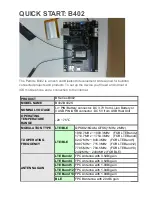
5
.
Panel Description
Upper display window
1
Lower display window
2
To the parameter key, the Enter key
3
Data shift key
4
Increase
key
the
5
Reduce the key
6
OUT Lamp
7
6
、
Display the status and basic operation
7
、
Parameter list and function
press and hold key 2 seconds, LOC parameter appears, set the LOC = 800,Then press
the key to confirm and enter the system parameter setting state.
Parameter
code
Meaning of
parameters
Explain
Setting
range
LOC
Parameter
lock
LOC<9000, will automatically for 0, allowed to modify the SV Set
Value.
LOC
≥
9000, are not allowed to modify the SV Set Value.
Set the LOC = 800, then press key to confirm, can enter the
following system parameters.
0
~
9999
3
4
OUT
AUT
A L 1
TF800
TMCON
PV
SV
A L 2
1
2
3
4
6
7
8
5
PV
SV
Press 2 SEC
+
The next
parameter
2 SEC
,
Return to the
previous parameter
For example:
measuring a value of 600.0
Set value 600.5
The basic display state
6
.
1
.
System parameter setting
PV
SV
LOC parameter
appears
,
Set the LOC = 800,
Then Press
In
s
tr
u
m
e
n
t p
o
w
e
r
Access to the system parameter setting state
In the basic display state, press and hold key 2 seconds, LOC parameter appears, set the
LOC = 800,Then press the button to confirm and enter the system parameter setting state.
, , Key can directly modify the parameter values. Press the key to reducing
the data, press the
to increase the data,Waiting to modify the value of the decimal
point will flash (like a cursor)
.
press key and hold, you can quickly increase / decrease in value,
And the speed will be automatically accelerated. also press the key to move to modify the
data location (cursor), the operation is more efficient. Key can be stored to modify
parameter values and display the next parameter,press and hold key 2 seconds,and can
return to the previous parameter;
and hold key and then press the key can
immediately exit the parameter setting state.
key
press
6.2 Set Value Setting
In basal display status, if the parameter lock “Loc” isn't locked, we can set setpoint (SV) by
pressing first
、
then can press , or to adjust value. Press key to decrease
the value, key to increase the value, and key to move to the digit expected to modify.
Keep pressing or , the speed of decreasing or inscreasing value get quick. The range
of setpoint is between the parameter SPL and SPH.
6.3 “At”PID Parameter auto-tuning
"At" parameter "OFF" is set to "ON" and then press the KEy to confirm instrument can start
the implementation of the auto-tuning Given function,the instrument in the basic display state
display will flash the word "At", the instrument after 2 oscillation cycle ON-OFF control can
automatically calculate the PID parameters.If you want to advance to give up auto-tuning , "At"
parameter “ON” is set to “OFF” and then press key to confirm.
Given tuning parameter values obtained are not identical, to perform auto-tuning function,
9
AL1
Lamp
8
AL2
Lamp
9
should be first given value set in
The most commonly used value or middle value, if the system
is good insulation properties of the furnace, the given value should be set in the system uses
the maximum, and then
Execute the start of the operation of auto-tuning function. Reasons to
learn, auto-tuning after the initial use, the effect may not be the best, you need a period of time
(usually the same time auto-tuning control) before they can get the best results.
AL1 high
limit alarm
value
AL1 low
limit alarm
value
-
999
~
+
32000
“HAL1” is the absolute value alarm or deviation value alarm, by
“ALtd” parameter definition.
When the value set to Max. will disable this function.(3200)
“LAL1” is the absolute value alarm or deviation value alarm, by
“ALtd” parameter definition.
When the value set to Min. will disable this function
.(-
999
)
AL2 high
limit alarm
value
AL2 low
limit alarm
value
“HAL1” is the absolute value alarm or deviation value alarm, by
“ALtd” parameter definition.
When the value set to Max. will disable this function.(3200)
“LAL1” is the absolute value alarm or deviation value alarm, by
“ALtd” parameter definition.
When the value set to Min. will disable this function
.(-
999
)
HAL2
LAL2
HAL1
LAL1
Alarm
hysteresis
Alarm mode
Avoid frequent alarm on-off action because of the fluctuation of PV
ALtd=0
,
AL1is the
is the
.
deviation value alarm,AL2
absolute
value alarm
ALtd=1
,
AL1 and AL2 is the absolute value alarm.
ALtd=2
,
AL1 and AL2 is the deviation value alarm.
Control
mode
onoF: on-off control. For situation not requiring high precision.
FPId: advanced artificial intelligence ”FUZZY PID“ control.
0
~
2000
0
~
2
OFF: close the
function.
ON: start a
function.
finish will automatically returns to the OFF state.
auto-tuning
auto-tuning
auto-tuning
auto-tuning
ON
OFF
onoF
FPId
onr: Reverse acting. Increase in measured variable causes a
decrease in the output, such as heating control.
ond: Direct acting. Increase in measured variable causes an
increase in the output, such as refrigerating control.
Selection of
heating
refrigeration
AHYS
ALtd
CntL
At
orEv
onr
ond
Proportional
band
Integration
time
No integral effect when I=0
1
~
32000
1
~
9999
seconds
Proportional band in PID and APID control. Instead of percentage
of the measurement range, the unit is the same as PV.
Generally, optimal P, I, D and CP can obtained by auto tuning. They
can also be manually inputted if you already know the correct
values.
P
I





















